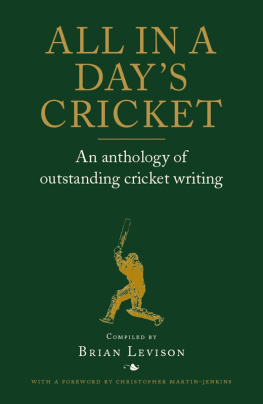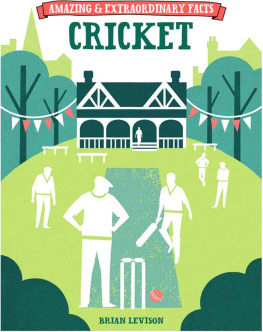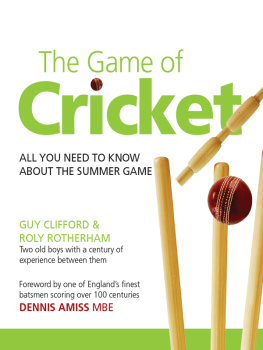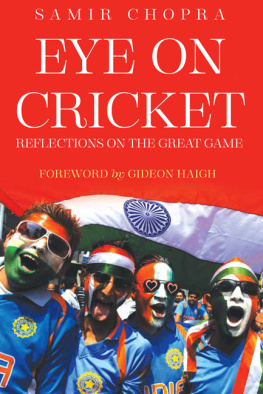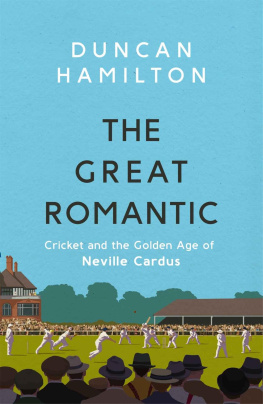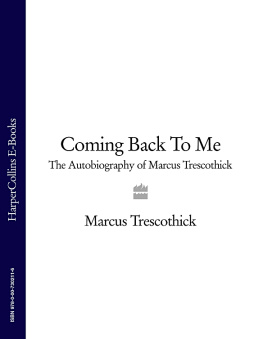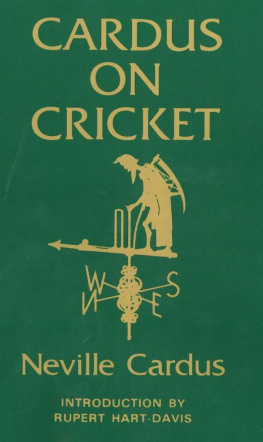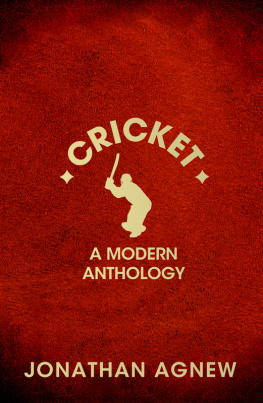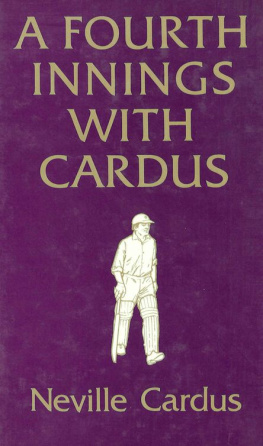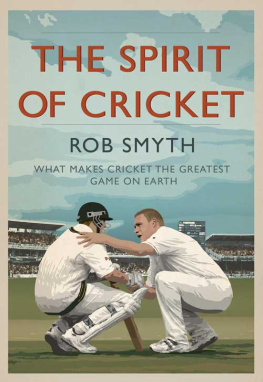ALL IN A
DAYS
CRICKET

ALL IN A
DAYS
CRICKET

An anthology of
outstanding cricket writing
COMPILED BY
BRIAN LEVISON

CONSTABLE
Constable & Robinson Ltd
5556 Russell Square
London WCIB 4HP
www.constablerobinson.com
First published in the UK by Constable,
an imprint of Constable & Robinson Ltd, 2012
Copyright Brian Levison 2012
The right of Brian Levison to be identified as the
author of this work has been asserted by him in accordance
with the Copyright, Designs & Patents Act 1988
Every effort has been made to obtain the necessary permissions with reference to copyright material. We apologize for any omissions in this respect and will be pleased to make the appropriate acknowledgements in any future edition
All rights reserved. This book is sold subject to the condition that it shall not, by way of trade or otherwise, be lent, re-sold, hired out or otherwise circulated in any form of binding or cover other than that in which it is published and without a similar condition including this condition being imposed on the subsequent purchaser
A copy of the British Library Cataloguing in Publication
Data is available from the British Library
ISBN 978-1-78033-123-2 (hardback)
ISBN 978-1-78033-906-1 (ebook)
Design & typography by Andrew Barron
Printed and bound in the UK
1 3 5 7 9 10 8 6 4 2
To my grandfather Samuel Lazarus,
who took me to Lords to see Compton and Edrich,
and to my grandson Jordan Urban,
whom sixty years later I took to see KP.
...The fielders draw long shadows
Through an evening clear and high.
Too soon into the pavilion
Players, umpires and I:
May there be cricket always
In the Long Room in the sky.
Brian Levison, Timeless Test
Contents

The Oval (Dudley Carew)
The Gatekeeper (R. C. Robertson-Glasgow)
The Duties of an Umpire (William Sapte)
Foreword

O NE LEARNS WITH experience, unfortunately, that the greatest of men have feet of clay. It is a shame, because we like our heroes, our icons, our role models.
Large sections of the modern media rely on celebrities to appeal to a mass market, and there is probably a childish gene in most of us that craves fame and the privileges it brings. Those who achieve celebrity by whatever means, however some through ambition and hard work, others by polishing divinely bestowed talent, a few by natural physical beauty and a willingness to exploit it, a few more through sheer notoriety soon learn that to be famous is a mixed blessing.
It requires a responsibility which proves too much for some. For an unfortunate few it brings loss of privacy, and in politics and sport in particular even the worthiest of the mighty tend to fall sooner or later. So we do well sometimes to remember and dwell upon not the infamous, but the unfamous; not the well documented, but the often unconsidered. Some mute inglorious Milton here may rest, some Cromwell guiltless of his countrys blood.
This is a refreshing collection of writings on cricket not because it neglects to praise some of the famous men and women of the game it does but because it concentrates more on what some of the earlier anthologists referred to, in deference to the most assiduous of early cricket researchers, F. S. Ashley-Cooper, as the highways and byways.
Most of us know something about Alastair Cook or Sachin Tendulkar or Don Bradman but I dare say that no one will be aware until he or she delves into the pages that follow that Frederik Ferslev is truly one of the unsung heroes of cricket, a Dane who worked with extraordinary determination during the Second World War to find a means of making new bats to keep the game going under German occupation in a country that has never been especially associated with bats and balls.
We could not play or watch cricket without quilt binders and pod shavers, groundsmen and rollers, umpires and scorers, stumps and bails, pads and gloves, captains and coins, boundaries and (well, in my day at least) bars. Where better to mix warmly with opponents, discuss the Test team, revel in a successful day or forget a bad one?
Even the great had bad ones. I was surprised to read W. G. Grace, the Great Cricketer, admitting that in 1859, albeit at the age of only eleven, he played eleven innings for the West Gloucestershire Club that produced twelve runs. Less so that Rachael Heyhoe Flint (now the Baroness) made about 380 not out in the garden against her elder brother and his friends, or to be reminded that Alfred Shaw took 13 for 11 against 22 of Wellington on the 1877 tour of New Zealand.
There is humour in the ensuing pages: Raymond Robertson-Glasgow on Somersets gateman; Alan Gibson on the travelling that overshadowed the joys of reporting county cricket; or Mike Brearley on why Bob Barber summoned him on to the field with a fresh pair of gloves. There is drama Frank Tyson describing his greatest day, Angus Fraser recalling Laras 375 out of 593 and poignancy: Graeme Fowler reflecting on the professionals need on tour to catch your emotions, bottle them and throw away the bottle.
About the only pleasure missing is poetry, which is noble of an editor who has won prizes for his own work in this field. But good writing was his sine qua non, and there is plenty of that. Dudley Carew, to give but two examples from the same piece: Hobbs played his innings as an actor plays a part in a play he has written himself; and Sandham... works in cool monotones, never attempting the heroic, but seeing that everything he does is in perfect taste.
Cricket, as Sam Johnson might have averred, has all that life affords. Almost every aspect is touched upon in this delightful collection. It is the product of wide reading, deep interest and a versatile mind.
Christopher Martin-Jenkins
Introduction

I N A WAY, a cricket match at whatever level is a minor miracle given the many things that have to come together for it to take place.
This book takes a different approach from many other cricket anthologies. While it is a selection of high-quality writing, it also has an underlying theme: all the activities that take place in order for a days play simply to happen. This provides scope for writing not often found in anthologies, about spectators, umpires, groundsmen, scorers, players (famous and unknown), travel arrangements (home and overseas from club to international level), venues, equipment, the life of cricketers off the field as well as on, some of the less savoury aspects of the game, and how the love of cricket so often has its roots in childhood. And, of course, there is the excitement of the cricket itself, its great games and its greatest players.
Contributors range from the best-known names, such as John Arlott, Neville Cardus, C. L. R. James and E. V. Lucas, to contemporary figures like Marcus Trescothick, writing about his introduction to cricket at the age of three; Angus Fraser, thrilled to meet Nelson Mandela; Phil Tufnell, shanghaied by Mike Gatting; Rachael Heyhoe Flint, on being the first woman to step on to the Lords ground as a player; Harry Pearson, Graeme Fowler, David Frith and many more. From a century and more ago come the words of John Nyren, C. B. Fry, F. S. Ashley-Cooper, Alfred Shaw, Nicholas Felix, James Pycroft, H. T. Waghorn, Richard Daft and W. G. Grace.
Next page
